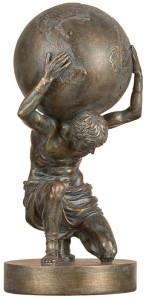WHY DOES GOD CREATE EVIL? WHY DID GOD PUT US TO A TEST? If Free Will can lead us to trouble, then why did He grant this to us? Why did we not have a choice in the matter? Why did humankind have to leave Heaven only to find their way back? These are existential questions that trouble inquisitive minds. Let’s explore them one by one.
to trouble, then why did He grant this to us? Why did we not have a choice in the matter? Why did humankind have to leave Heaven only to find their way back? These are existential questions that trouble inquisitive minds. Let’s explore them one by one.
1) The Creation of Evil:
God does not create evil. He is no more responsible for our evil than a parent who has given a normal child all the best upbringing but then the child falls into a life of crime regardless.
4:79: “Allah never creates evil. Things and events have good and evil aspects. When you act according to the Law of Allah the results are pleasant, and when you act against the Law the results are unpleasant (42:30). So whatever good happens to you is from Allah, and whatever evil happens to you is from yourself. We have sent you as a Messenger to mankind and Allah is Sufficient as Witness.” (Quran as it Explains Itself, by Dr. Shabbir Ahmed)
2) Are we predestined?
No. We are not predestined but are born with a potential (taqdeer).
25:2: “He is the One Who creates all things in precise design and gives them the potential (taqdeer) to become what they are meant to be.”
Qadar or Taqdeer (in the orginal Quraish dialect Arabic of Prophet Muhammad (S)) denote the potential of all things appointed by God. And man determines his own destiny by following those laws.
3) Was Man really in Paradise before being expelled?
There are many verses referring to ideal societies as “Paradise” on Earth, and Hell is sometimes used as a metaphor for earthly “hellish” societies:
2:25: “And convey happy news to those who have chosen to be graced with belief, and have done acts of service to humanity. Plush gardens with rivulets flowing underneath! When they are provided with the delicious fruit of their deeds therein, they will say, “This is the provision we were given
before (on Earth).”
6:6: “We had established them on earth more firmly than you, and We gave them plenty of blessings of the heavens and the earth, abundant showers from the sky and rivers flowing beneath them…”
9:49: “Of them is he who says, “Grant me leave, and draw me not into trial.” Have they not fallen into trial already? In fact, Hell is all around the disbelievers.”
Hence, the story of Adam (from “Udema”, a creature capable of living in a community) and his spouse and their giving in to Iblis/Satan (evil/selfish desires), and being expelled from “Paradise” is best understood as an allegory of the first civilized community of humans who fell into selfish sectarianism and divided like branches of a tree. They hence lost their “Paradise” or Ideal Society, likely sometime in the Neolthic (early civilized man) Era. The Quran clearly indicates that Adam and his wife were part of an entire community:
2:38: “We said, “ALL (an entire community, not just two people) of you have degraded yourselves from your Paradise (ideal society).”
4) Why was humankind not asked permission or given a choice before being created?
Did you ever ask your parents why they gave birth to you? No. He need not get our permission but does give us some of the reason for our existence: to realize our potential. Please read on.
5) The Gifts (and burdens) of Free Will and Reason:
Unlike any other creature, humans have free will and the capacity to reason:
15:29: “And when I have perfected him in due proportion and breathed into him something of My Energy, bow before him.” (That something will be the gift of free will, the ability to make decisions (76:3)).”
Free Will and Reason can lead to good and bad consequences depending on how we use them. There are two allegories in the Quran, one showing the good, the other the bad side. Please note that the Quran, which is the highest standard of Classical Arabic language, is rich with symbolism, allegories, and metaphors. Note also that Reason is the key to understanding which verse is allegorical and which verse is literal.
2:26: “Behold, Allah does not shy away from citing any kind of allegory, even of an insect. Since the believers exercise reason, they know that it is the Truth from their Lord. On the other hand, those who have chosen to disbelieve, try to ridicule by saying, “What could Allah mean to teach by this similitude?” Thus His Law of guidance lets go astray many and shows the Way to many. (But note) He never lets go astray except those who drift away from Reason.”
a) The first allegory (appearing only 3 verses after 2:26) demonstrates the great potential humankind has due to Free Will and Reason:
2:30-1: “He announced His Plan to the angels (the entities that are responsible for all “invisible” natural laws including death, recording deeds, gravity, internuclear forces, aerodynamics, etc.), “Behold, I am about to place a creation in the earth that will inherit it.” They exclaimed, “Will you place on it such creation as will cause disorder therein and shed blood! Whereas we strive to establish Your glory in the Universe and make it manifest that You Lord are Impeccable!” He answered, “Behold, I know that which you know not. Then Allah endowed mankind with the capacity to attain knowledge (that the angels would never have). Then He showed the angels certain things and said to them, “Tell me if you have the capacity to learn about things in the Universe, in case what you say is true.” (That this new creation is but vain).
b) The second allegory, in 33:72, warns of the dangers of Free Will. This verse confuses many since it is taken literally. But note, it is allegorical and contrasts the IMMENSE heavens, earth, and mountains, (which obviously never had free will, reason, or a choice) with the TINY humans who often rebel against Divine Laws by exercising their Free Will negatively.
33:72: “Verily, We did offer the trust of compliance to the heavens, and the earth, and the mountains and they, being fearful, breach not what is entrusted upon them. Yet man, with his free will, is the only one who breaches this trust of compliance. For, verily, he wrongs himself without knowing it.”
6) Why does God test us?
When a math teacher puts an exam before you, you are actually TESTING YOURSELVES to see your progress.
67:2: “He has created death and life to let you go through diverse circumstances, and thus distinguish for yourselves who would do better. He is Almighty, the Absolver of imperfections.”
29:2: “Do people think that they will be left (at ease) simply because they say, “We believe”, and will not be put to a test?”
2:155: “(Adversity is a great barometer of the strength of personality.) Fear, hunger, loss of wealth, loss of life and devastation of crops are examples of adversities that let you test your mettle. Our Law will let you try yourselves with such tribulations. Hence, give glad tidings to those who remain proactively steadfast.”
7) What is the Meaning of Life?
To realize our potential as individuals and communities on this Earth…and the Hereafter.
38:27: “We have not created the heavens and the earth and all that is between them in vain – without meaning and purpose. Such is the assumption of those who disbelieve. (10:4), (11:7), (45:22), (53:31). Woe from the Fire to those who deny the Truth!”
45:22: “God has created the heavens and earth with a definite purpose, and in order that every ‘self’ may be compensated for what it has earned. And no injustice will be done to them.”
84:19: “That you will traverse higher and higher from one plane to another. (Civilizations will keep advancing in sciences, and individuals will always have a chance to grow in goodness. Furthermore, evolution of the ‘Self’ will carry on in the life to come).”
For me not knowing the purpose of life beyond realizing our potential as individuals and communities, does not nullify all the other Guidance of the Quran. If there is a higher purpose, I will be fine to wait to discover it later or in Hereafter. Let’s just try to get there in good shape. Otherwise we face a barrier of stagnation called “Jahannum” where we will have all the answers but benefit no more from them.
Like this:
Like Loading...




